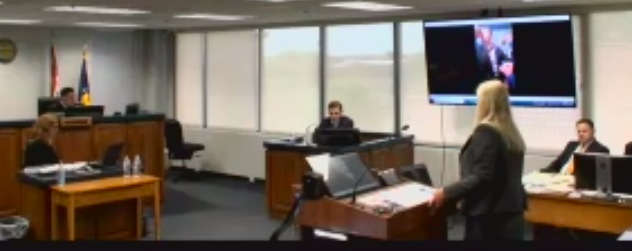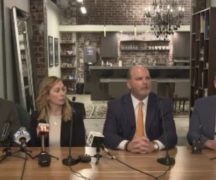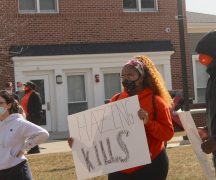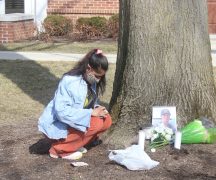By DAVID DUPONT
BG Independent News
Testimony in the trial of two BGSU fraternity members on charges related to the death of Stone Foltz in March 2021, continued Thursday (May 19).
The testimony of four of Foltz’s fellow pledges, combined with testimony yesterday by another pledge and a fraternity officer laid out the process those aspiring to join the Pi Alpha Kappa fraternity went through leading up to the Big-Little event during which Foltz consumed so much alcohol that he died several days later.
Jacob Krinn, 21, of Delaware, Ohio, who was Foltz’s “big brother” in the pledging process, faces charges of first degree felony involuntary manslaughter, third degree felony involuntary manslaughter, reckless homicide, felonious assault, hazing, failure to comply with underage Alcohol Laws, and Obstructing Official Business.
Troy Henricksen, 24, of Grove City, who was the new member educator and a former president of the fraternity, faces charges of third degree felony involuntary manslaughter, reckless homicide, tampering with evidence, hazing, and failure to comply with underage alcohol laws.
After the opening testimony of Shari Foltz, Stone Foltz’s mother, on Wednesday, the jury has heard from: Niall Sweeney, external vice president of the fraternity, which is known as PIKE, and pledges, Grant Hartnett, Nicholas Pavone, Hunter Hendrix, Mitchell Myer, and Jacob Kin.
The testimony largely covered the same territory, with the prosecution led by County Prosecutor Paul Dobson and Assistant Prosecutor Pamela Gross and the defense led by Samuel Shamansky, representing Krinn, and Eric Long, representing Henricksen.
All the pledges had to take a weekly pledge class during which they had to learn about the fraternity. The classes were run by Henricksen and the assistant new member educator, Jarrett Pritzel.
Of particular interest was the requirement that pledges be able to recite from memory the preamble from the founding of the fraternity. Many, including Foltz, had difficulty doing this. A couple others didn’t even bother looking it over before the class during which they were expected to have it memorized.
It was Foltz’s inability to complete the task that held him up from driving home to Delaware for a family responsibility.
Pavone recalled Pritzel yelling at the pledges for not being able to memorize the preamble.
Pledges were also given small books in which they were supposed to collect 40 signatures from active members. The active members would solicit favors in return. They may ask the pledge to clean their house, or swipe them into the dining commons, or pick up food for them. In one instance, the pledges were asked to come and help clean up at Ziggy’s where a fraternity member worked. In return they could collect three signatures and either a discounted or free rental of the facility for a pledge party. This occurred right before the Big Little event.
Pledges were also summoned to cheer on active members and hold up the fraternity’s letter at ultimate Frisbee games.
At one point, they were told that they would have to build a fire – either a bonfire or in a fire pit – at an off-campus house occupied by PIKE members including Henricksen, and keep it going around the clock. That never happened because the pledges objected, said Pavone, who said the pledge class was smaller than usual and would be impossible for members to accomplish the task given their schedules.
After this there was talk on social media that this class was “soft.”
They did build an igloo at the house.
The defense attorneys repeatedly noted that there were no ramifications for members who did not do any of this.
The prosecution emphasized that these expectations were clearly spelled out.
Sweeney noted that within his memory only one pledge was refused admittance, and that was for his rude and inappropriate behavior toward women.
Most time was spent on the Big-Little event.
At this event, the pledges would be introduced to their fraternity big brothers who would help guide them through the pledging process the rest of the semester.
Pledges submitted a ranked list of three active members they wanted as their bigs.
Beforehand, several pledges reported that Henricksen advised them to tell their professors they would not be in class the next day and call off from work. Though he did not state why.
All the pledges reported a sense of unease about what would happen at the event, and active members did not provide much detail. The expectation was it would involve heavy drinking of alcoholic beverages.
One told them to shave their pubic hair and asked: Are you afraid of pigs?
None of this, the defense said, came from members of the fraternity hierarchy.
And nothing came of that warning.
Foltz and Hendrix were especially concerned because they had slight frames and would not be able to absorb as much alcohol.
They had watched a news segment earlier about a student who died from alcohol poisoning.
On the night of March 4, they drove to the house, occupied by Sweeney, at 318 N. Main St., Bowling Green. Henricksen was not there, which some of the pledges found strange.
Kin said: “I thought it was kind of irresponsible for head pledge educator not to be there.”
He was later questioned by the defense about why he didn’t bring this concern up when he talked to police.
Once they gathered there, the eight pledges were told to take off their neckties and blindfold themselves with them. Then with linked arms they were guided into the house’s darkened basement where rock music was blasting. The active members were making strange noises and were lightly bumping and pushing the pledges as they entered. Once gathered in a circle their blindfolds were removed, and they were greeted by their big brothers. They greeted each other, and the bigs handed the pledges a bottle of liquor. The type of liquor was the same they had been given when they were pledges and the same their big brothers had been given, going back in time. This succession of littles and bigs is referred to as a family.
The pledges who testified said their impression was that they would have to drink the entire bottle, and applause broke out when the first member finished his.
One of the first to finish was Foltz, and Kin and Hunter saw him being carried out of the house by several members. Kin recalled Krinn was helping with Foltz, and that a half-hour later he saw Krinn in line at Ziggy’s.
The prosecution paid careful attention to what happened when the inebriated pledges were brought back to their apartments. Some bigs stayed for some time with them. Others made sure their roommates or other friends were checking on them.
The pledges said they felt the need to drink their bottles because of their sense that it was a tradition and was expected in order to be accepted by the active members. There was a competitive atmosphere, Sweeney said.
Some big brothers helped the pledges by drinking some of the bottles. Other pledges surreptitiously dumped out part of the contents.
None could point to any person who told them they had to drink the whole bottle.
They did it on their own. Shamansky told Pavone: “Nobody forced you. You did it of your own free will because you wanted to be one of the cool kids.”
One pledge did not drink because he had a court-ordered sobriety test scheduled the next day.
The next morning as news of Foltz’s condition circulated, the pledges received a message on the Facebook massage group about an important meeting. The group chat disappeared shortly after. The pledges did not attend the meeting. Several said they did not think it occurred.
The defense also asserted that several of the pledges’ stories had evolved over time, and certain details were not mentioned to police or David DeVillers, the special prosecutor brought in by BGSU to investigate the incident.
Sweeney received a plea deal from the prosecutor, but the two sides, with the approval of the judge, agreed not to bring that up.
[RELATED: Defendant in Foltz case pleads guilty to reduced charges]
Five other fraternity members – Pritzel, Daylen Dunson, Canyon Caldwell, Aaron Lehane, and Benjamin Boyers –were indicted and later agreed to plea to lesser charges.





